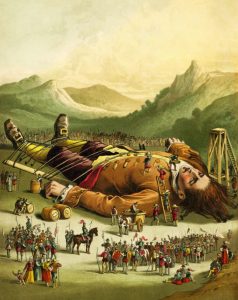7
Objectives:
- Students will recognize the importance of storytelling.
- Students will apply the reading process to analyze the reading.
Materials:
- Image from Gulliver’s Travels
- YouTube video of animated version of Gulliver’s Travels
- Handout: “Stories as a Reflection on Culture.”
Warm-Up/Free-Write:

Ask students to free-write for six to ten minutes about the image from Gulliver’s Travels. Suggested Prompt: Free-write about the image. Tell a story. What is happening? Why?
Note: Let them know that the image may be familiar to some students. If they recognize the image, they can write what they remember. If not, they can imagine the story. After students finish writing, invite volunteers to share their ideas. (Ask for those students who know the story to hold their comments until the end of the discussion.)
Build Context
Show the animated version of Gulliver’s Travels, Ask students to re-tell or summarize the story in groups or as a whole class.
Preview the Reading
Ask students, “What is the first step of the reading process? What does preview mean?” Preview the reading together as a class. Ask students to preview the Introduction to The Folktale Project, “Stories as a Reflection on Culture.”
Suggested Questions: What do you notice? What questions do you have?
This reading is adapted from an anthropology textbook. What do anthropologists study? What might be the connection between the title, the image, and the field of anthropology? Ask students may share their responses in pairs before soliciting volunteers from the whole class.
Read “Stories as a Reflection Culture”
Ask students to read the introduction at least three times.
Suggested Process: In the first reading, ask students to read to understand the gist. Advise against using the dictionary at this point. They can ask themselves to reflect on the following questions: 1) What is this reading about? 2) What is it telling the reader? In the second reading, ask students to underline unfamiliar vocabulary. Look up key words in the dictionary if meaning cannot be understood from context. Identify the appropriate definition. For the third reading, ask students to highlight/mark important ideas.
Reflect and Discuss
Students can draft responses prior to the discussion and then meet in cooperative groups (or breakout rooms to discuss). Perhaps each group creates a poster or Google doc with their responses to one of the questions.
Suggested Questions:
1) Why are stories important? To individuals? To a culture or society?
2) What can we learn from a story like Gulliver’s Travels?
3) Think about stories you have heard or read. Describe a time when a story, a book, or a narrative impacted your life or taught you a lesson.
4) Choose four or five words and complete vocabulary process. (word, part of speech, sentence from the text, definition that fits with context, other word forms, illustration or your own example).
